
Communion: Memorial or Sacrifice?
 |
Communion: Memorial or Sacrifice? |
Bible Truth Communion: |
One of the main points of division between the Catholic Church and most Protestant Churches is the Eucharist, also known as Holy Communion or the Lord's Supper. Catholics, along with the Orthodox Churches, believe in the Real Physical presence of Christ's body and blood in the consecrated bread and wine of Communion. In common with their practice of desacralising of worship and belief, at the Reformation most Protestant groups, denied that there was any physical change in the bread and wine of communion. Jesus body and blood were not physically present, and Communion became just a memorial, in which Jesus was present, if at all, only spiritually by Faith. A few groups, like the Lutherans and some Anglo-Catholics, retained a form of belief in the Real Presence, but most Protestant Churches strongly denied this, downgrading the Communion Service to a rarely-performed rite of little significance. Did Protestants Follow the Bible on This? It is very difficult to see how they did. Although protestant leaders claimed always to be following clear biblical doctrine, when one actually looks to the bible one finds little to support the Protestant/Evangelical position. LUKE 22 20. In the same way, after supper, he took the cup, saying. "This cup is the new covenant in my blood, which is poured put for you." Protestants who deny the miracle of the Real Presence of Jesus' body and blood in the Eucharist, tend to ignore Jesus clear words "This is my body" and "my blood", and concentrate on the phrase "Do this in remembrance of me." Using this to argue that the Eucharist was only meant to be symbolic. But of course, if we do something in memory of someone, (give a gift, for example) that does not necessarily mean that what we do (or the gift) is not real. So let's look at some other passages, to see whether they confirm the symbolic, or the Real, view of Communion. JOHN 6 This seems very clear. Jesus is not speaking symbolically. He is stating that His flesh and blood are not only real food and real drink, but that His body and blood are necessary to give life. In fact as we see in a following verse, his hearers certainly understood his teaching in this manner. 60. On hearing it, many of his disciples said, "This is a hard teaching. Who can accept it?" And some of them did not accept His teaching then, either: 66. From this time many of his disciples turned back and no longer followed him. Paul too reaffirms the reality of Jesus's body and blood in Communion. 1 Corinthians 11 Once again, here is an insistence on the reality of the presence of the body and blood of Jesus in Communion, and a demand that we recognise the sacredness of this sacrament. Yet this seems to be another of those biblical passages that most Protestants completely ignore. What Did the Early Christians Believe? Attempts are sometimes made to imply that the early Christians treated Communion in a cavalier manner, and therefore could not have believed in the Real Presence. But here they confuse Communion with the Agape Meal, or Love Feast, at which bread and wine were shared. If, however, we look at the writings of the Christian leaders of the earliest period, we can see that the real presence in the Eucharist was a central belief of the Early Church: Ignatius of Antioch, a disciple of
both Peter and John, writes against Gnostic heretics of
his day: Justin Martyr, writing around A.D. 155, describes the early Christian belief about the Lord’s Supper this way:
So, we see that the idea that Holy Communion is only symbolic and that the bread and wine of the Eucharist does not become the Real Body and Blood of Jesus, is a totally novel doctrine, newly invented by Protestants. |